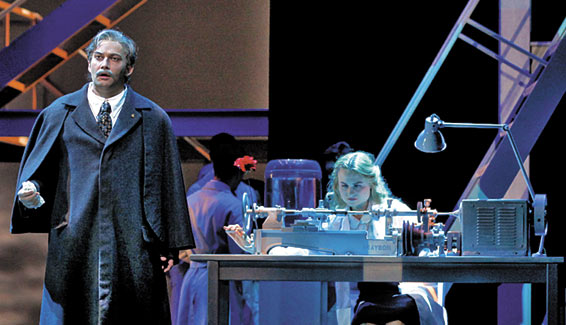|
|
|
|
|
|
|
|
| Financial Times, November 30, 2011 |
| By Martin Bernheimer |
|
|
|
Gounod: Faust, Metropolitan Opera New York, 29. November 2011 |
|
|
Faust, Metropolitan Opera, New York
|
 Gounod’s
romantically sweetened, naively superficial yet deliriously pretty version
of Goethe’s Faust was first performed by the Met at its grand opening in
1883. The vehicle became so ubiquitous that wags dubbed the place a
Faustspielhaus. The opera’s popularity has not been sustained in recent
times, however, and the most recent production, a cheeky version staged by
Andrei Serban in 2005, lasted only 16 performances. Gounod’s
romantically sweetened, naively superficial yet deliriously pretty version
of Goethe’s Faust was first performed by the Met at its grand opening in
1883. The vehicle became so ubiquitous that wags dubbed the place a
Faustspielhaus. The opera’s popularity has not been sustained in recent
times, however, and the most recent production, a cheeky version staged by
Andrei Serban in 2005, lasted only 16 performances.
Although Peter
Gelb, the presumably budget-conscious super-impresario, might have revived
it this season, he turned instead to a staging by Des McAnuff imported from,
and shared with, English National Opera. At the US premiere on Tuesday it
managed to rankle conservatives and disappoint progressives at the same
time.
The director, celebrated for Jersey Boys on Broadway and
Shakespeare in Canada, tried desperately to make Faust relevant – now
there’s a dirty word – historically, sociologically and politically. He
banished storybook kitsch, kept the stage dark and stark. He moved the
action to the mid-20th century (back and forth between wars) and
superimposed an irrelevant subplot about the creation of the atom bomb in
Los Alamos. Faust the philosopher is here a laboratory scientist. Robert
Brill’s basic set, embellished with video imagery, is a steel grid flanked
by dizzying spiral staircases. The narrative, meticulously planned and
neatly executed, is essentially tough, hyper-intellectual and relentlessly
grim. Gounod’s opera, unfortunately, is none of these things. It is just a
hum-along love story.
The Met argued sound better than sight.
Although Gallic purists could not be ecstatic about the accents, either
verbal or stylistic, the cast seemed committed to McAnuff’s cause.
Jonas Kaufmann enacted the protagonist’s plight sensitively, shading
the line with heroic ardour and exquisite finesse, as needed. He sculpted
long pianissimo phrases that took our breath away, if not his. Under the
circumstances, one actually expected a diminuendo on the top C of “Salut,
demeure” – a feat managed by such past paragons as Giuseppe Sabbatini and
Giuseppe di Stefano. That turned out to be wishful expecting. Maybe next
time.
Marina Poplavskaya, an early replacement for Angela
Gheorghiu, played the emphatically modern Marguerite with stoic pathos.
Essentially a daring singing-actress rather than a disciplined vocal
technician, she gave all she had. Sometimes it was enough.
René Pape
sang lustily as a jolly, debonair Méphistophélès. He even managed a nifty
soft-shoe routine during his mock-serenade. Still, a bit more sardonic
danger would have been useful.
Russell Braun found Valentin’s
dramatic outbursts more congenial than his lyrical reflections. Michèle
Losier brought gutsy bonhomie to Siébel’s Hosenrolle platitudes, and Wendy
White simpered deftly as Marthe Schwerdtlein.
Yannick Nézet-Séguin,
the much applauded conductor, dared restore passages often cut (including
the Walpurgisnacht episode, here mimed rather than danced). He also managed
to enforce unusually broad tempos without compromising sentimental nuances.
He gave his singers steady support and rose gratefully to the gushing
climaxes. The stage may have been cool, but the pit was warm.
|
|
|
|
|
|
|
|
|
|
|
|
|
|
|
|
|
|
|
|
|